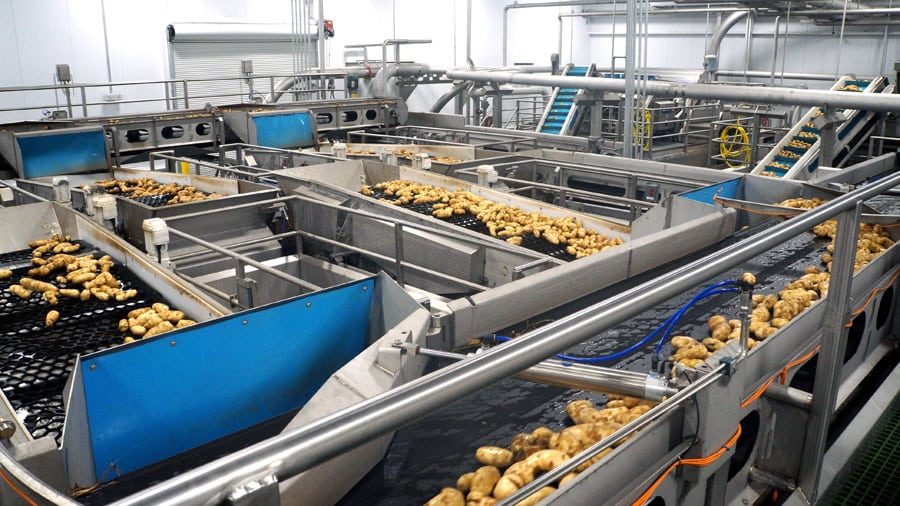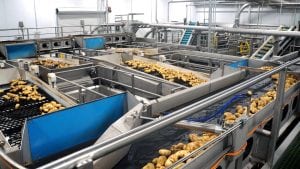
Home » Lamb Weston doubles fry production with Richland plant expansion
Lamb Weston doubles fry production with Richland plant expansion

November 15, 2017
Lamb Weston’s expansion of its Richland potato processing plant adds two million more pounds of frozen french fries daily to the worldwide market.
The new $200 million addition has nearly doubled the company’s output of frozen spuds in Richland.
“We’ve incorporated 45 years of making french fries into this factory,” said Mark Schuster, Lamb Weston’s Richland plant manager.
The new processing line opened near the company’s Innovation Center at 2013 Saint St., north of the Richland Airport.
[blockquote quote="We take a lot of pride in making great french fries." source="Rick Gardner, senior director of operations for Lamb Weston" align="right" max_width="300px"]
The expansion of current plant operations has resulted in about 150 jobs, providing mostly hourly work for operators and technical-skilled processors. This adds to the approximately 2,500 people employed by Lamb Weston across the Tri-Cities.
At an Oct. 16 ribbon-cutting ceremony for the new facility, leaders and politicians thanked the company for making the Tri-Cities “the frozen french fry capital of the world.”
With almost 300 operating days each year, Lamb Weston now will be able to produce about 600 million pounds of frozen french fries annually across three processing lines.
“We take a lot of pride in making great french fries,” said Rick Gardner, senior director of operations for Lamb Weston.
After a million man hours on site, the plant emerged from “sagebrush and dirt” into a 290,000-square-foot state-of-the-art facility.
“This expansion allows us to build on our presence here in Richland, while increasing our capabilities so we can grow with our customers around the globe,” said Tom Werner, president and CEO of Lamb Weston. “We’re proud to be a part of the community in the Tri-Cities, and we’re especially grateful to our community partners who worked with us to make this expansion a reality.”
The company said 75 percent of the product produced in the Tri-Cities remains in North America. The other 25 percent gets exported to 100 different countries, many in the Pacific Rim, with Japan being a top importer of frozen french fries.
Most potatoes are grown within a 60-mile radius of the Tri-Cities, allowing Mid-Columbia growers to supply the crop that will be shipped around the world in the form of traditional, straight-cut fries and waffle fries.
“People all over the world are eating our french fries, and they love them all over the world,” Schuster said.
The Richland plant manager explained that the Tri-Cities was chosen as the spot for the new processing line for a number of reasons, starting with the Columbia Basin being “one of the best spots in the world” for potato growing.
This attribute was critical, as well as an ability to supply the potatoes needed for the increased demand.
In addition, Schuster cited the varied access to transportation to ship the product, including ports, as well as proximity to the nearby corporate office and innovation center.
“Richland has an awesome work force,” Schuster said. “Now we have about 600 employees who work for us here. A highly engaged, passionate pride is found in this work force.”
Those 600 employees combine with another 650 who work at two manufacturing facilities in Pasco, as well as 1,500 workers in Kennewick at business and engineering offices, resulting in one of the region’s largest employers, offering a mix of management and manufacturing jobs.

The Richland plant, built in 1972, employed about 500 people before the opening of the new line. The plant and its expanded facility are within easy access to a massive commercial freezer in Horn Rapids that provides storage for frozen products.
“Choosing Richland validates that we’re very competitive in Eastern Washington, making the Tri-Cities a destination for food processing.” said Carl Adrian, president and CEO of the Tri-City Development Council, or TRIDEC.
During the planning stages, economic development officials referred to the expansion as “Project Domino,” a code name assigned to the development deal as Lamb Weston was evaluating possible sites.
Washington state committed $250,000 to the expansion project through the Governor’s Strategic Reserve Fund, which supports economic projects, including those that help grow or retain existing businesses.
TRIDEC matched some of the money but declined to provide an exact figure, only to say it was “a little less than the state.”
Adrian predicted the multiplier on the jobs created from Lamb Weston’s expansion will mean another 100-plus jobs, likely in the service and hospitality industries.
“This is an important project for Richland and the Tri-Cities,” Adrian said.
State Sen. Sharon Brown, R-Kennewick, spoke of her excitement about the jobs created by the plant’s expansion and the trickle-down effect on the Tri-City economy, covering everything from the growers providing the potatoes to the boxes used to ship the product.
“There’s a (science, technology, engineering and math, or STEM)-related element to this as well, as you look around and you see the mechanization of the operation and the facilities,” Brown said. “When I talk to STEM kids, I try and tell them, ‘Not every STEM job requires a PhD in nuclear physics.’ There’s a lot of other places, like this, where you can use your STEM-based knowledge.”
Brown said she is encouraged by the prospect of even more growth for Lamb Weston in the Tri-Cities.
This enthusiasm was bolstered by Werner: “You have my commitment, and my leadership team’s commitment that we are going to invest in this business going forward.”
Describing the frozen potatoes market as “red hot,” Washington Potato Commission executive director Chris Voigt said potatoes provide almost $7.5 billion in economic activity in the state.
Voigt said Washington produces potatoes on 170,000 acres each year, with about 20,000 acres for fresh potatoes and the remaining for potatoes intended for processing, thanks to a higher starch content.
The commission hopes the land capacity will expand, or growers will find a way to harvest potatoes more frequently on current land to meet increasing global demand.
Water restrictions are a limiting factor, as the land might be available, but it may not have irrigation access. In addition, potatoes are a crop considered susceptible to soil pests, limiting growers to planting only once every three to four years.
Voigt said some farmers have found a way to plant yearly using a rotation of wheat, mustard and potatoes, with the mustard providing a natural fumigant to the pests invading the spuds.
But this isn’t viable for every field or every potato variety, forcing the need for a new solution, “We’re either going to be stagnant, or we’re going to need to figure out how to get water to current dry land, or shorten our rotation to grow every two years by managing our soil differently,” Voigt said.
There are times of the year, including the fall, when Lamb Weston is able to turn around a potato from the field to a finished product in four hours.
“We have basically a conduit between the process and the product,” Brown said. “We grow the product right here, we process it, turn it around and ship it out.”
Lamb Weston was spun off from ConAgra Foods Inc. last fall, to become its own publicly-traded company. Announcing its first quarter results for 2018, Lamb Weston (NYSE: LW) reported net sales up five percent year over year, totaling $817 million.
Real Estate & Construction Local News
KEYWORDS november 2017





